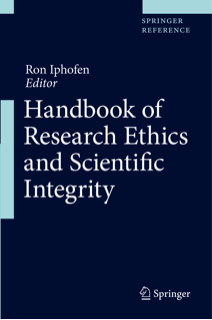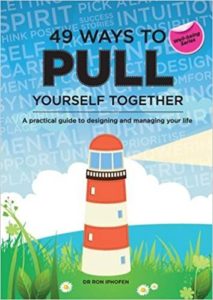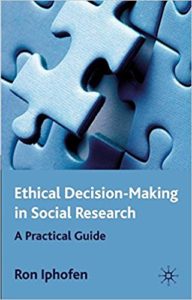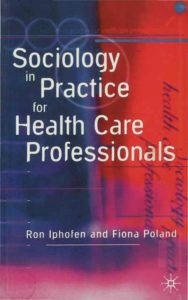The Handbook of Research Ethics and Scientific Integrity (2020) Ron Iphofen (ed.)
https://www.springer.com/fr/book/9783030167585
This handbook offers current information, issues and challenges in the fields of research ethics and scientific integrity. It provides a comprehensive coverage of research and integrity issues, both within researchers’ ‘home’ discipline and in relation to similar concerns in other disciplines. The handbook covers common elements shared by disciplines and research professions, such as consent, privacy, data management, fraud, and plagiarism; it also includes contributions from academics from various disciplines, treating issues specific to their fields. Readers can quickly source the most comprehensive and up-to-date information, protagonists, issues and challenges in the field. Experienced researchers keen to assess their own perspectives, as well as novice researchers aiming to establish the field, will equally find the handbook of interest and practical benefit. It saves them a great deal of time in sourcing the disparate available material in these fields and can be a first ‘port of call’ for a wide range of researchers, research advisors, funding agencies and research reviewers. It offers practical advice and guidance to researchers in a wide range of disciplines and professions to help them ‘think through’ their approach to difficult questions related to the principles, values and standards they need to bring to their research practice.
The SAGE Handbook of Qualitative Research Ethics (2018) – Ron Iphofen and Martin Tolich (eds.)
https://uk.sagepub.com/en-gb/eur/the-sage-handbook-of-qualitative-research-ethics/book251811
This handbook is a much-needed and in-depth review of the distinctive set of ethical considerations which accompanies qualitative research. This is particularly crucial given the emergent, dynamic and interactional nature of most qualitative research, which too often allows little time for reflection on the important ethical responsibilities and obligations. This Handbook is a one-stop resource on qualitative research ethics across the social sciences that draws on the lessons learned and the successful methods for surmounting problems – the tried and true, and the new.
Finding Common Ground: Consensus in Research Ethics Across the Social Sciences (2017)
http://books.emeraldinsight.com/page/detail/?k=9781787141315
This is the first Volume in a series: Advances in Research Ethics and Integrity – published by Emerald. It grew out of a set of symposia led by the UK Academy of Social Sciences to discover the consensus in research ethics across the social sciences. Volume 2 in the Series: The Ethics of Online Research (edited by Kandy Woodfield) came out in 2018.
49 Ways to…Pull Yourself Together: A practical guide to designing and managing your life
http://stepbeachpress.co.uk/books
This work grew out of clinical hypnosis practice, adult education, student counselling and health research. The intention was to draw together a range of practical guidance and advice that worked for many people.
Ethical Decision Making in Social Research
https://www.palgrave.com/gp/book/9780230210356#reviews
This book was designed to offer practical, user-friendly guidance to ethics in research. It helps researchers to manage ethical dilemmas that arise while research is being planned, conducted and reported. It is built around a unique ‘ethical review checklist’ to help researchers think through their ethical practice at each stage of a research project.
Sociology in Practice for Health Care Professionals
https://www.macmillanihe.com/page/detail/Sociology-in-Practice-for-Health-Care-Professionals/?K=9780333645765
I wrote this with my colleague Fiona Poland when we were both ‘persuading’ health professionals of the value of sociology to their clinical practice. We found that existing texts tended to require readers to pursue the discipline of sociology rather than explore its value to their own professional needs. This is an avowedly introductory text which adopts a cumulative approach – building analytical skills with direct reference to health care examples and linking to readers’ personal and professional experiences. To make it more accessible to a wide range of health professionals we adopted the same active learning approach we used in our teaching – applying sociological insights to health and illness and to health professional practice.





